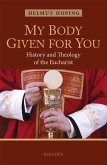This book explores lived experiences of college students that represent late Millennials and Generation Z with a post- modern/post-Christian worldview. The qualitative method of interpretative phenomenological analysis (IPA) was used to reveal what those experiences were, and four interpretative lenses were used that revealed how the perception of those experiences can be understood. The research involved 425 students from St. Edward's University in Austin, Texas, in addition to selected faculty and staff. A total of 49 religious affiliations were represented on campus, of which 38 incorporate Communion into a church service. Their participation helped in discovering what the students experienced, explained in their own words and in their own way Their participation also helped in discovering the meaning lived experience during Communion. All of the students encountered who they identified as a supernatural God; however, what the students perceived was not informed by historical or biblical contexts. Consequently, this book also examines the ways in which participants in Communion experienced Christ as described in church history and in the biblical text. Emerging across the research were key discoveries towards understanding how celebrating Communion can communicate biblical truth to postmodern communities populated by late Millennials and Generation Z with a post-Christian worldview by retelling the redemptive story. Such understanding associates a Christian celebration with meaning making. The first section creates a historical background from the upstairs room where Christ introduced Communion through the present day. Three lenses to investigate church history: (1) how significant church developments granted or denied access to the Communion bread and wine; (2) how biblical passages were used to describe Communion; and (3) how liturgy was used to retell the redemptive story of God. Section two addresses what it is that students experienced; not what they should or ought to experience, but what is actually experienced. The qualitative method used was committed to examining how people make sense of their lived experiences in detail, and recognizing the meaning associated with those experiences identified by the experiencer. The method also suspends predetermined language allowing students to define their own explanation. The third section deals with the way a lived experience can be understood within the context of a religious ceremony by assessing how words and actions are used during Communion. Four systems were used to assess the perceived experiences of the students to help see what is actually going on in their lived experience during Communion. A description of the characteristics of spirituality and religious beliefs and behaviors of students is offered in the fourth section. The section explores how others influenced the way students describe their experience of spirituality and religion; the way Communion facilitates the expression of an experience of spirituality and religion; and how the students described God. The fifth section interprets the biblical text centered around the words of Christ, "This is my body...this is my blood" (Matt. 26:26-28). From the perspective of Communion, Passover is viewed historically, and the Wedding Supper of the Lamb is viewed eschatologically showing how God was experienced in the bread and wine in the text of Scripture. A contrast between how God is expressed in the biblical text and how each student experiences God is shown. The final section brings together all discoveries that emerged, developing a theoretical model of how Communion, as a Christian ceremony, can function to retell the redemptive story in a postmodern community populated by late Millennials and Generation Z who participate or observe in Communion while holding sub-orthodox biblical views.

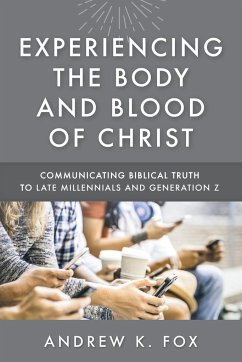
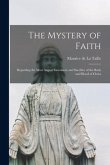
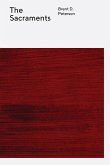
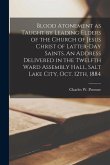
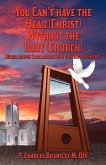
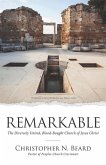
![Remarks on Doctor Strachan's Pamphlet Against the Catholic Doctrine of the Real Presence of Christ's Body and Blood in the Eurcharist [microform]: Add Remarks on Doctor Strachan's Pamphlet Against the Catholic Doctrine of the Real Presence of Christ's Body and Blood in the Eurcharist [microform]: Add](https://bilder.buecher.de/produkte/66/66195/66195964m.jpg)
